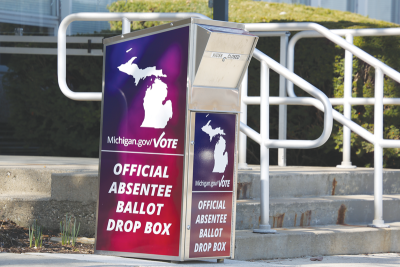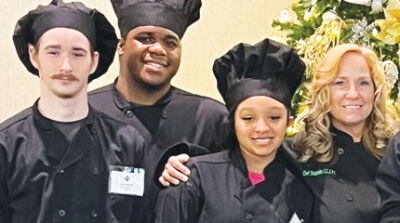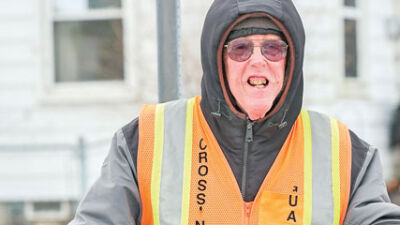
A ballot drop-off box stationed outside of Mount Clemens City Hall was among those used for early voting.
Photo by Dean Vaglia
MACOMB COUNTY — It was an election two years in the making.
After Michigan voters passed Proposition 2 in 2022 with a 60% majority, the first statewide election with nine days of early voting arrived in February.
With the election now weeks behind them, several Macomb County clerks took time to reflect on their experiences with new laws and how things could be different going forward.
The buildup
Going into the election, clerks had differing expectations as to what implementing early voting would be like. For Harrison Township Clerk Adam Wit, there were no expectations for the new system.
“I really didn’t have a lot of expectations because with so much change for us, it was all a learning experience,” Wit said. “I’ve done a lot of elections at this point and this one was different from anything else we’ve ever run before.”
Delayed software and word from the state were a common gripe from the clerks, as Mount Clemens Clerk Cathleen Martin attests to.
“It was a lot of ‘fear of the unknown’ with the nine days of early voting, and given the fact the state was very late on developing software and providing information to us so that we could train our workers,” Martin said. “We were trained pretty late in the game, so that was kind of a stress; not knowing what it would look like, not knowing what the software would look like, but we managed, and our workers really came through for us.”
Putting the election together also involved a lot of work on the part of clerks and their staff.
“We expected that it would be both mentally and physically exhausting, and that was in fact the case,” Macomb Township Clerk Kristi Pozzi said. “Our office worked 27 of the 29 days in February, so it is taxing for any individual to put on that type of manpower.”
The execution
When the polls opened on the first day of early voting, election workers and voters got their first taste of what this new procedure would look like. One of the main differences between regular voting and early voting is the consolidated precincts, leading to the deployment of a ballot-on-demand system.
“We have this new piece of equipment where it prints the ballot out right then and there,” Martin said. “The workers really seem to like it. That way I don’t have to have all these ballots from all six precincts and there was less of a chance of a mistake or confusion. It was easy to just hit ‘Republican ballot for Precinct One” and it would print out the ballot.”
Once voters received their ballots and cast them, the unique software came into play.
“The biggest change for early voting is that we’re using a secured connection directly to our qualified voter file,” Wit said. “We have live data that we will record for voters so that would prevent anyone from, even if they went and early voted and ran as fast as they could across the parking lot and tried to request an absentee ballot from my office, they couldn’t do it. The computer would already say, ‘Nope, you’ve actually voted already in early voting.’”
Wit said the security procedures operated without issue, which he attributed to feedback from pilot early voting held in November 2023.
Every night, the polls would be put into a suspension mode and locked up. While tampering was not a concern expressed by the clerks, Martin was weary about muscle memory causing an issue.
“I was deathly afraid that they would accidentally hit ‘close polls’ and then the result would tabulate,” Martin said. “They’re used to hitting at the end of the day the ‘close polls’ button and that generates the results for the early voting. They did great. They really helped alleviate any fears I had.”
Votes were not tallied until Feb. 27.
Turnout varied from community to community, but each saw members of their community show up to the polls. Meltzer saw Clinton Township residents make great use of early voting over the weekends, while Pozzi saw nearly 1,000 Macomb Township residents take part in the election.
The special election
What set Clinton Township’s election apart from others was the presence of a special election on the ballot. A normal ballot features the special election alongside the partisan primary elections, but new deadlines for mailing and sending back ballot selection forms created situations where voters could have received separate local-only ballots. While the additional ballots would later be spoiled to prevent double voting, Kim Meltzer, Clinton Township clerk, said they presented an inconvenience for election workers and mail-in voters.
“What some thought is that when they got the second ballot that had only the local race on it, they would vote it, put it in the drop boxes and then think they had the ability to still go on election day and vote there for a presidential race,” Meltzer said. “There was so much confusion. It was incredible, in my opinion.”
Meltzer says she spoke with someone from the Michigan Department of State regarding the issue, claiming the official agreed changes should be made regarding this aspect of post-Proposal 2 elections.
As for early in-person voting, Meltzer was pleased with how it went but hoped for a larger turnout.
The recap
Looking back, Pozzi believes the primary was a learning experience for clerks.
“Being on the Michigan Association of Municipal Clerks, if you follow the Facebook page you would see that a lot of clerks were in distress getting to this Feb. 27 election, and that’s because we had so many nuances we were trying to figure out,” Pozzi said. “I think now that we have that one under our belt, we are better prepared and ready for the ability to administer these elections in August and November and going forward.”
Her sentiments were shared with Martin.
“I think this was a really good trial run,” Martin said. “It was a perfect election to practice on. It was a lot easier than I thought it would be after we finally got the information we needed from the state.”
Most clerks plan on maintaining one site for November, but Meltzer says Clinton Township plans to have three at-large early voting sites for the general election. She’s in talks with several locations for securing those sites but has found the process of finding the additional sites that are relevant to voters difficult. Meltzer expressed that for the ease of finding such sites, early voting could be moved to the county government’s responsibility.
“It seems like (Macomb Community College) would be a great opportunity, but not in Clinton Township or any other community that is run by local clerks, because if I want to host it at the college, I can’t serve all those other people who are coming from Macomb County,” Meltzer said. “I can only serve those students that are Clinton Township residents. I can’t really use the college as a location for an early voting site, even though it would be a great one if it were a county-run election.”
Meltzer believes a ballot proposal to make early voting county-run is imminent.
 Publication select ▼
Publication select ▼






















